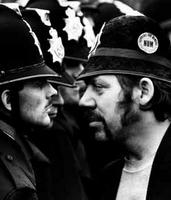Peace is a compelling if rather over-stylized writer. Moreover, aspects of his style become tics, overused and so less effective the more you read of him. But he is worth reading.
My friend John Kraniauskas argues that his books are in fact treatises on the British state. In so far as the Red Riding Quartet is crime fiction, then they are clearly about the state in the ways that all such fiction is: detailing the state apparatus's attempts to reimpose order and rationality after criminality has upset the social order. Like many post-Chandler crime writers, Peace is also concerned to demonstrate that the order imposed by the state is, however, not so easily separable from the disorder against which it is apparently arrayed. The state, too, is delinquent.
 GB84 is interesting because it takes the style and motifs of crime fiction, and applies them to a situation that is more readily read as straightforwardly political, the 1984 miners' strike. The state here is faced with political protest, or rather a labour protest with strong political overtones, and its response is in part to criminalize protest and in part to become itself criminal. (Meanwhile, the union also takes on aspects of the state, as registered in the parody recorded by Don McPhee's photograph, and also in semi-jocular references to the "Socialist Republic of South Yorkshire.")
GB84 is interesting because it takes the style and motifs of crime fiction, and applies them to a situation that is more readily read as straightforwardly political, the 1984 miners' strike. The state here is faced with political protest, or rather a labour protest with strong political overtones, and its response is in part to criminalize protest and in part to become itself criminal. (Meanwhile, the union also takes on aspects of the state, as registered in the parody recorded by Don McPhee's photograph, and also in semi-jocular references to the "Socialist Republic of South Yorkshire.")Of course, the interesting question is why most people generally accept a firm distinction between police and prey, rather than questioning the state's legitimacy. Peace, like other crime writers, resorts to what are ultimately rather unsatisfactory responses: corruption, cover-up, manipulation of the press, ignorance, and so on. Like, say, James Ellroy (whose extraordinary American Tabloid and The Cold Six Thousand take the same approach to an epic sweep of mid-century US history), the important demarcation for Peace is less that between civil and criminal, law and outlaw, than that between insiders and outsiders, those in the know and those outside the loop.
The severest punishments, imposed by the state and the anti-state alike, are reserved for informers, those who threaten to break the code of silence and reveal the true mechanisms of power. Yet when word does get out, it can too often easily be dismissed as the fantasies of cranks, the ramblings of conspiracy theorists, or the delusions of paranoids. The greatest tragedy is always that of those who, Cassandra-like, are condemned to have their denunciations treated as another round of resentful crying wolf.
Or is it that the tremendous popularity of crime fiction in the twentieth century reveals that we do in fact know that the state is just another mafia, whose power is maintained by corruption rather than consent? But our silence, our complicity, is the open secret that finally binds society.
Meanwhile, here is a great review of Ellroy. I've yet to see such a good one of Peace.
[UPDATE: I see that k-punk has also been reading GB84.]
No comments:
Post a Comment